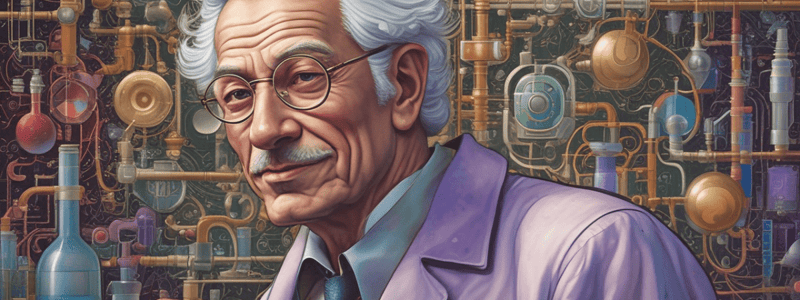Podcast
Questions and Answers
What was Ilya Prigogine awarded the 1977 Nobel Prize for?
What was Ilya Prigogine awarded the 1977 Nobel Prize for?
- Peace
- Chemistry (correct)
- Literature
- Physics
Ilya Prigogine was born in Belgium.
Ilya Prigogine was born in Belgium.
False (B)
What was Ilya Prigogine's father's occupation?
What was Ilya Prigogine's father's occupation?
Chemical engineer
Ilya Prigogine's family moved to ______________ after leaving Russia.
Ilya Prigogine's family moved to ______________ after leaving Russia.
Match the following awards with their respective years:
Match the following awards with their respective years:
What sparked Ilya Prigogine's interest in chemistry?
What sparked Ilya Prigogine's interest in chemistry?
According to Prigogine, determinism is still a viable scientific belief.
According to Prigogine, determinism is still a viable scientific belief.
What is the name of the book co-authored by Prigogine and Isabelle Stengers?
What is the name of the book co-authored by Prigogine and Isabelle Stengers?
What is the concept that Prigogine and coworkers proposed to solve the arrow of time problem of thermodynamics and the measurement problem of quantum mechanics?
What is the concept that Prigogine and coworkers proposed to solve the arrow of time problem of thermodynamics and the measurement problem of quantum mechanics?
Prigogine's work concentrated on the fundamental role of _______________________ in nonlinear systems on both the classical and quantum level.
Prigogine's work concentrated on the fundamental role of _______________________ in nonlinear systems on both the classical and quantum level.
Prigogine believed that determinism loses its explanatory power in the face of irreversibility and instability.
Prigogine believed that determinism loses its explanatory power in the face of irreversibility and instability.
What is the name of the traffic model developed by Prigogine and professor Robert Herman?
What is the name of the traffic model developed by Prigogine and professor Robert Herman?
What is the concept that Prigogine asserts has been 'extended' three times in physics?
What is the concept that Prigogine asserts has been 'extended' three times in physics?
Match the following concepts with their corresponding descriptions:
Match the following concepts with their corresponding descriptions:
What was Ilya Prigogine's achievement in 1939?
What was Ilya Prigogine's achievement in 1939?
Ilya Prigogine was arrested by the Germans during World War II.
Ilya Prigogine was arrested by the Germans during World War II.
What was the focus of Ilya Prigogine's research that won him the Nobel Prize in Chemistry in 1977?
What was the focus of Ilya Prigogine's research that won him the Nobel Prize in Chemistry in 1977?
Ilya Prigogine was awarded the title of _______________________ in the Belgian nobility by the King of the Belgians in 1989.
Ilya Prigogine was awarded the title of _______________________ in the Belgian nobility by the King of the Belgians in 1989.
Match the following awards with the year they were awarded to Ilya Prigogine:
Match the following awards with the year they were awarded to Ilya Prigogine:
Flashcards are hidden until you start studying
Study Notes
Ilya Prigogine: Life and Career
- Born on January 25, 1917, in Moscow, Russia, to a Jewish family
- Family left Russia in 1921 and settled in Belgium, where Prigogine received Belgian nationality in 1949
- Graduated from the Athenée d'Ixelles in 1935, majoring in Greek and Latin
- Initially enrolled in law studies, but developed an interest in psychology and chemistry, leading to a double major in chemistry and physics
- Earned a PhD in chemistry in 1941 under Théophile de Donder
Research and Contributions
- Contributed to the discovery of dissipative structures and their role in thermodynamic systems far from equilibrium
- Awarded the Nobel Prize in Chemistry in 1977 for his work on non-equilibrium thermodynamics
- Developed the theory of dissipative structures, which led to pioneering research in self-organizing systems and philosophical inquiries into complexity and time in natural sciences
- Co-authored books with Isabelle Stengers, including "The End of Certainty" and "La Nouvelle Alliance"
Work on Unsolved Problems in Physics
- Focused on the fundamental role of indeterminism in nonlinear systems on both classical and quantum levels
- Proposed a Liouville space extension of quantum mechanics to address the arrow of time problem and the measurement problem
The End of Certainty
- Argued that determinism is no longer a viable scientific belief due to the limitations of deterministic equations in explaining irreversibility and instability
- Claimed that the introduction of irreversibility led to the reintroduction of the arrow of time in physics
- Asserted that unstable systems can only be explained statistically, rather than deterministically
Studying That Suits You
Use AI to generate personalized quizzes and flashcards to suit your learning preferences.
